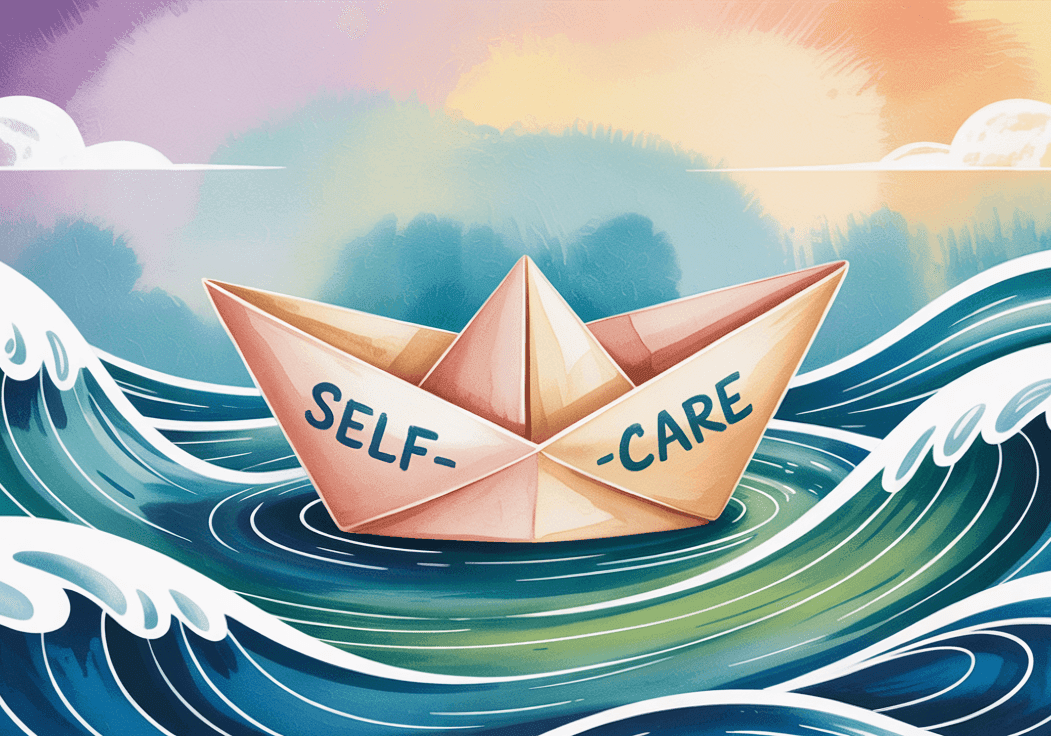Welcome. If you’re here, I want to first acknowledge something important: it takes courage to care for yourself—especially when you’re navigating the heavy fog of depression or the racing thoughts of anxiety. Just showing up here is a gentle act of self-care.
When your energy feels drained or your mind is overwhelmed, the idea of self-care might sound like another thing you “should” be doing. But what if it didn’t have to be big, complicated, or perfect? What if it could be small, gentle, and just enough?
In this guide, we’ll explore what self-care really means, especially for those of us living with mental health challenges. You’ll learn why starting small matters, how to build a doable routine, and simple ways to care for your body, mind, and heart—without pressure.

Understanding Self-Care
What Is a Self-Care Routine?
A self-care routine is a set of small actions you take—on purpose—to support your well-being. It could be taking three deep breaths before a stressful call, making your favorite leisurely lunch, texting a trusted friend, or stepping outside for two minutes of fresh air.
Self-care is about nourishment, unlike self-indulgence (which might bring temporary escape). It’s about tending to yourself with kindness—not fixing, forcing, or caring.
If guilt pops up, know this: caring for yourself is not selfish. It’s necessary. You deserve the same care you offer others.
Why Self-Care Matters for Depression and Anxiety
Self-care isn’t a cure, but it is a lifeline. Gentle routines can:
- Help stabilize your mood over time
- Ease the weight of daily overwhelm.
- Offer tiny sparks of hope and motivation.
It’s not about doing it all—it’s about doing one thing, then maybe another. That’s how the fog begins to lift. That’s how healing starts—with gentle steps.

Building the Foundation for Your Self-Care Routine
Self-Reflection: Knowing Your Needs
To build a routine that works for you, start by noticing:
- What soothes you (warm drinks, quiet music, stretching)
- What drains you (social media doomscrolling, skipping meals)
- What boundaries might support you (saying “no” kindly, limiting screen time)
This is a gentle inventory—not a judgment.
Common Myths That Hold People Back
Let’s bust a few myths that might be standing in your way:
- “It’s selfish to put myself first.”
- Truth: You can’t pour from an empty cup. Your well-being matters.
- “Self-care is expensive or time-consuming.”
- Truth: Some of the best self-care is free—deep breaths, sunlight, saying no.
- “I’m too tired to start.”
- Truth: That’s okay. Start by resting. That counts, too.

Simple Self-Care Ideas (No Pressure)
Physical Self-Care
- Do gentle stretches or go for a slow walk
- Sip water or eat a simple meal.
- Rest without guilt—listen to your body.
Emotional Self-Care
- Let yourself feel without needing to fix.
- Try journaling a few words about how you feel.
- Listen to calming music or create your own playlist.
Social Self-Care
- Send a quick “thinking of you” text.
- Join safe online spaces or small groups.
- Say no to protect your energy when needed.
Mental Self-Care
- Take screen-free breaks—step outside, play a simple game.
- Limit doomscrolling or news intake.
- Replace self-criticism with kinder thoughts, like “I’m doing my best.”

Creating a Realistic Self-Care Routine
Starting Small and Being Kind to Yourself
You don’t need a perfect plan. Try one small thing a day—whatever feels most doable.
If you skip a day? That’s okay. You can always begin again.
Setting Up Simple Reminders
- Leave sticky notes with kind prompts (“Drink water,” “Breathe”)
- Set gentle app reminders.
- Pair self-care with habits you already do (like brushing your teeth)
Tracking Your Progress Gently
- Notice what’s helping—no need to track everything.
- Celebrate small wins (like getting out of bed or drinking water)
- See patterns over time—not for judgment, but for insight.
Dealing With Setbacks and Tough Days
Some days will feel heavy. When they do:
- Return to the smallest step (deep breath, short rest)
- Reach out—text a friend, call a helpline, write it down.
- Remind yourself: you can always begin again.

Encouragement and Next Steps
There’s no “right” way to do self-care. Just your way. Every small step matters.
You are worthy of care even on the hard days—especially on the hard days.
You don’t have to do this alone. Below are some gentle resources to explore and a few FAQs if you still have questions.
FAQs About Starting a Self-Care Routine
Q: How do I start a self-care routine when I always feel overwhelmed?
Start tiny. Choose just one act that feels doable. Even brushing your hair or opening a window counts.
Q: What if my routine doesn’t seem to help my depression or anxiety?
It’s okay. Keep it simple and consistent, and reach out for support—self-care complements professional help, not replaces it.
Q: How long does it take to notice changes in self-care?
It’s different for everyone. Some feel a lift quickly; others see gentle shifts over time. Keep going.
Q: Are there self-care routines just for anxiety or depression?
Yes—like grounding techniques for anxiety or behavioral activation for depression. But even basic care matters, too.
Q: What if someone judges me for prioritizing self-care?
Your care is not up for debate. Their judgment says more about them than you. You deserve support, not shame.
Conclusion
If you take just one thing from this post, let it be this: you are allowed to care for yourself, even if all you do today is breathe and begin again.
Start small. Stay kind. And keep going.
We’re in this together.
💙 If you feel up to it, share one gentle win in the comments—or a tiny tip that’s helped you care for yourself. You never know who you might encourage.
✨ Ready to bring more clarity and calm to your week? ✨
My free Weekly Planner is designed to help you stay organized, track habits, and make room for self-care—all in one simple printable.
👉 Sign up below to grab your free planner today!



